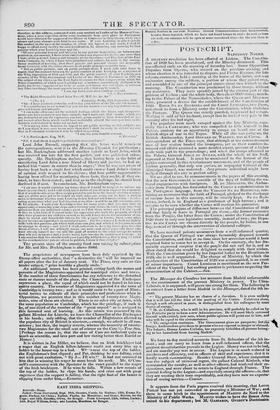The proprietors of newspapers have been duly apprized by the
Stamp-office authorities, that " u distinctive die " will be imposed on all papers after the 1st of January next. The Times, very sore on this tender subject, " grills horrible a ghastly smile." An additional return has been printed, setting forth the names and pursuits of the Magistrates appointed for municipal cities and towns. If the number of these functionaries has any reference to the disturbed state or riotous morals of the place, the Chancellor of the Exchequer represents a place, the equal of which could not be found in his own native country. The number of' Magistrates appointed for the town of Cambridge is twenty-two ; and as it would seem to be apart of Minis- terial tactics to ridicule all their principles and professions when in Opposition, we perceive that in this number of twenty-two Magis- trates, nine of them are clerical. There is no other city or town, with the same population as Cambridge, which has the privilege, if such it be, of one-third of the number of the "great unpaid" as is assigned to this favoured seat of learning. As this return was procured by the ,.allant Member for Lincoln, we leave the Chancellor of the Exchequer in his hands ; only adding, that the number of Magistrates allotted to the populous city of Bristol is nineteen,—enough, we admit in all con- science ; but then, the inquiry reverts, whence the necessity of twenty- two Magistrates for the small seat of science on the Cam ?—True Sun. I.Perhaps the reason is, that the sons of Cam are turbulent quite as much as scientific, and love port and low rioting better than Euclid or Homer.] It is written in Joe Miller, we believe, that an Irish bricklayer laid a wager that an English fellow-labourer could not carry him up a ladder to the house-top in a hod. WI' -n near the top of the ladder, the Englishman's foot slipped ; and Pat, thinking he was falling, cried out with great exultation, " By J— I'll win!" It had not occurred to him that in winning his wager he must break his neck. Mr. O'Con- nell's controversy with the Spectator is the exact parallel to the wager of the Irish bricklayer. If he wins he falls. Within a few rounds of the top of the ladder, he claps his hands, and cries out with great eagerness that the support is failing, that the right foot of the bearer is slipping from under him,—Examiner.


























 Previous page
Previous page